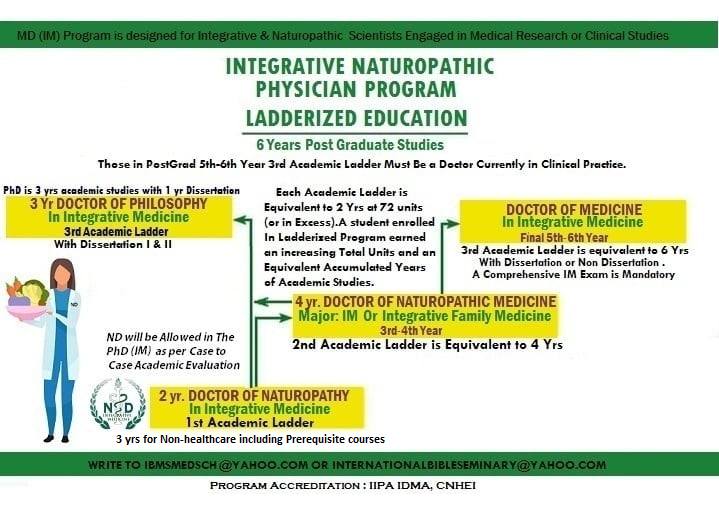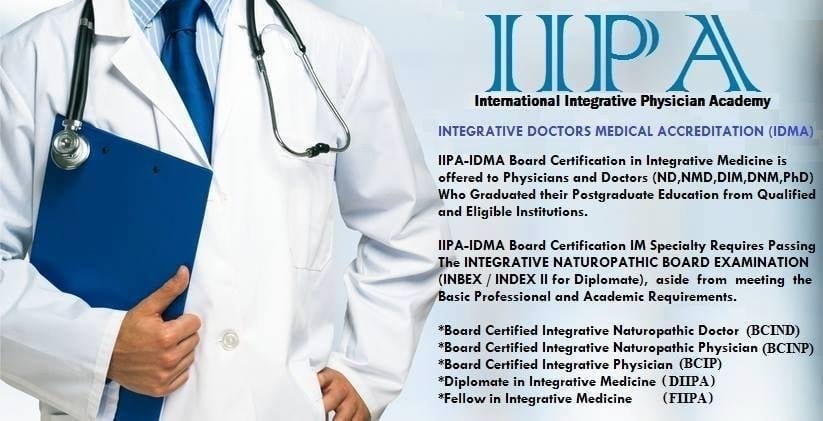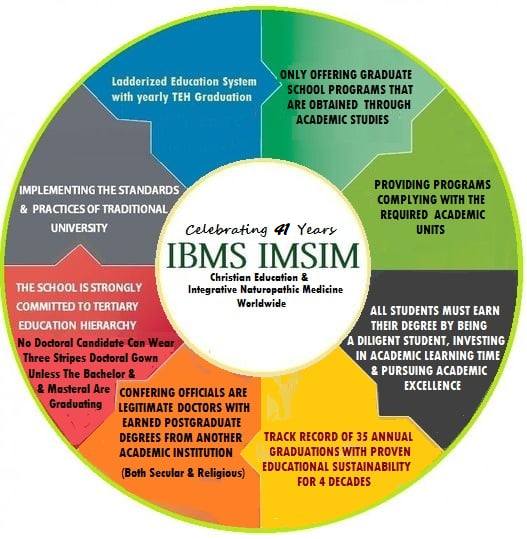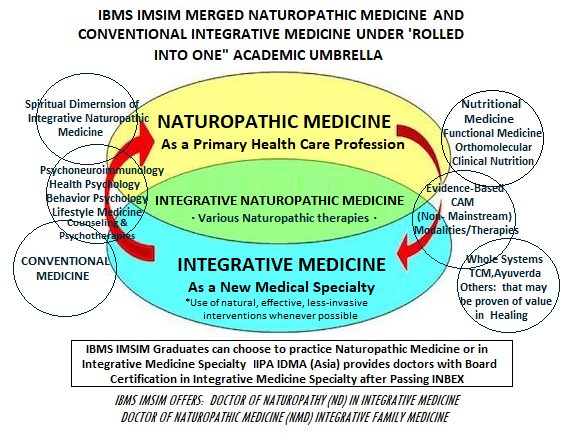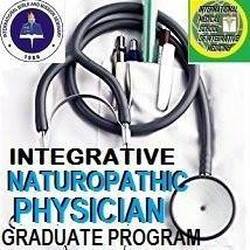
What is the Meaning of IBMS-IMSIM's Doctoral Courses Majoring in Conventional
Integrative Medicine?
Fake Versus The True Conventional Integrative Medicine...
While some Alternative organizations nowadays, are loosely using the word "Integrative Medicine" to simply join the current bandwagon, but used it as a vehicle to propagate their own brand of Alternative healing system. They have gone even further by offering them as the core emphasis of their ND curriculum in the Naturopathic schools they operate. IBMS-International Medical School of Integrative Medicine has strongly embraced the concept of Evidenced-Based Medicine (EBM) and committed to uphold the latest therapeutic protocol, and "Gold standard of treatment" for Disease-Management, in the administration of Natural and Conventional therapeutics.
The true Integrative Medicine, also called 'Conventional IM' is health care that uses all appropriate therapeutic approaches—conventional and non-mainstream—within a framework that focuses on health, the therapeutic relationship, and the whole person. In essence, this new medical paradigm, has merged Conventional Medicine and Non Conventional Medicines (NCM) and utilizes a wide array of evidence-based CAM treatments and modalities to treat illness as well as enhance wellness throughout the lifespan.
INTEGRATIVE NATUROPATHIC MEDICINE PROGRAM AT IBMS IMSIM
IBMS IMSIM MERGED NATUROPATHIC MEDICINE AND CONVENTIONAL INTEGRATIVE MEDICINE UNDER A "ROLLED INTO ONE" ACADEMIC PROGRAM
They are not to be regarded as two separate academic disciplines, IBMS IMSIM's Integrative Naturopathic Medicine Program has merged Naturopathic Medicine and Integrative Medicine under a 'rolled into one' academic umbrella, while also gravitating other healing methods as study courses on each sides that may be proven of value in treating disease or healing.
LADDERIZED INTEGRATIVE NATUROPATHIC PHYSICIAN PROGRAM
Beginning our Academic journey in our IM program
On one hand, our doctoral students study NATUROPATHIC MEDICINE as a fully-developed medical system and primary health care profession in North America; while on the other hand, majoring (as academic major) in INTEGRATIVE MEDICINE, a fast rising model of healthcare, now a distinct Medical Specialty in the US. Our entire Ladderized program basically consists of 3 academic ladders (see Fig. below)
THE WISDOM OF UNITING THE TWO
IBMS IMSIM's academic wisdom TO UNITE THE TWO in the academia many years ago will provide more gainful insights to doctors who are into optimal wellness and whole person healing to integrate the most useful and proven therapies into their standard practice. A combination approach will result in a more satisfying, better health outcomes.
IIPA-IDMA BOARD CERTIFICATION
Graduates of Integrative Naturopathic Medicine can choose to practice Naturopathic Medicine or in Integrative Medicine Specialty .IIPA IDMA (Asia) provides doctors with Board Certification in Integrative Medicine (IM) Specialty after passing INBEX .
21ST CENTURY INTEGRATIVE NATUROPATHIC HEALTH CARE
Our IBMS IMSIM Integrative Naturopathic Medicine (INM) doctoral programs (ND, NMD degrees) was academically-developed as a reaction to the changing social, cultural, and health care landscapes of the 21st century. By focusing on holistic patient-centered approach than disease-centered management, the naturopathic care and the use of evidence-based therapeutic methods and substances are 'tailor-made' ( tailor treatment protocols for each patient) to encourage the individuals’ inherent self-healing process and aims to address the underlying root causes of their health issues; and by its emphasis on prevention, optimal health and treatment in combination with the human body's innate ability to heal, enhances the health span, not just the life span, of each patient.
PROMOTING BALANCE & VITALITY WITHIN THE MANY SYSTEMS OF THE BODY
It is not just practicing medicine in a way that selectively incorporates elements of CAM at the doctor’s discretion per patient, Integrative Naturopathic Medicine has a larger meaning and mission, its focus being on HEALTH AND OPTIMAL HEALING. INM Doctors developing health plans towards enhancing bodily systems, strategizing a cellular approach to health, immune systems support , cancer prevention, among others.
DOCTOR AND PATIENT PARTNERSHIP
The primary role of INM doctors/physicians is educating, empowering, and motivating patients to assume more personal responsibility for their health by adopting a healthy attitude, lifestyle and diet, exercise, quality of rest and sleep, and the nature of relationships.
WHOLE PERSON, INDIVIDUALIZED APPROACH
Naturopathic physicians identify specific weaknesses or dysfunctions in their patients and tailor treatment based upon the patient's individual presentation. It is the patient that is in need of treatment, not the disease state or symptom. Naturopathic physicians are interested in finding and treating characteristic symptoms that define the patient rather than common symptoms that define the disease. Naturopathic doctors treat each patient by taking into account individual physical, mental, emotional, genetic, environmental and social factors.
PATIENT-CENTERED
The very essence of how INM doctors practice medicine is from a patient-centered perspective. Because naturopathic doctors take more time with their patients . Recognizing and understanding the biochemical individuality of each person, according to their unique nutritional and supplementation needs based on their genetics, lifestyles and environmental exposure.
NATURAL THERAPEUTICS
As Western medicine has become dependent on expensive technological solutions to health problems, on the other hand, Integrative Naturopathic Medicine has catered on holism and simple methods of intervention, such as dietary and lifestyle-modification, stress management and relaxation training, botanical medicine, supplementation in conjunction with the human body's innate ability to heal, which are are often effective.
EVIDENCE-BASED MEDICINE
Where Integrative Naturopathic Medicine will also have a heavy reliance on scientific evidence to determine appropriate naturopathic treatment. This “evidence” comes in the form of research and studies as well as the use of various laboratory tests. Of course, it relies on good physical exams and patient history first and foremost.
IBMS IMSIM OFFERS :
DOCTOR OF INTEGRATIVE MEDICINE (IMD)
DOCTOR OF NATUROPATHY (ND) IN INTEGRATIVE MEDICINE
DOCTOR OF NATUROPATHIC NEDICINE IN IM OR INTEGRATIVE FAMILY MEDICINE
DOCTOR OF INTEGRATIVE MEDICINE
DOCTOR OF NUTRITIONAL MEDICINE
DOCTOR OF ALTERNATIVE MEDICINE IN INTEGRATIVE NATUROPATHY
Write to:
Office of the Registrar
[email protected]
[email protected]
THE PROGRAM IN A NUTSHELL
Similar to Allopathic training, Postgraduate Students enrolled in the IBMS IMSIM Integrative Naturopathic Physician Program will likewise learn the medical practice of History Taking, Physical Examination and Clinical Assessment, as essential IM courses in our Ladderized Program. While one of the IBMS IMSIM's academic aims requires her postgraduate students to develop and hone an effective IM skills in Differential Diagnosis; Hence, it is essential and fundamental to the program, that our students have mastered and become experts in clinical Naturopathic Assessment and Diagnostic techniques. Furthermore, they also study modern Laboratory tests and sophisticated diagnostic imaging tools; and effectively correlating those results with the patient's clinical presentation of signs and symptoms. Though different in medical paradigm and clinical approach with Conventional medical doctors, our Integrative Medicine Doctors will look into the root causes of the patient's disease and is treating the "whole person" not just the symptoms.
On the other hand, while the therapeutic measures/strategy can permit the use of pharmaceutical drugs in some cases, in a combination approach with evidence-based natural therapies; still, the Clinical Orientation is directed towards a healing goal - either to the reduction or elimination of the drug therapy - as a gradual process over the course of time. As mentioned above, all the treatment/therapies/strategies involved should be in accordance with the latest clinical evidence and reputable scientific studies .
AN APPROACH THAT USES THE BEST EVIDENCE-BASED PRACTICES
Integrative Medicine in practice, combines the scientifically substantiated aspects of Western Medicine with Complementary and Alternative modalities/therapies that have undergone clinical trials and has been proven effective in bringing about healing and sustained optimal wellness.
The Defining Principles of Conventional Integrative Medicine Adhered by all IBMS IMSIM Postgraduate Students :
1. Patient and practitioner are partners in the healing process.
2. All factors that influence health, wellness, and disease are taken into consideration, including mind, spirit, and
community, as well as the body.
3. Appropriate use of both conventional and alternative methods facilitates the body's innate healing response.
4. Effective interventions that are natural and less invasive should be used whenever possible.
5. Integrative medicine neither rejects conventional medicine nor accepts alternative therapies uncritically.
6. Good medicine is based in good science. It is inquiry-driven and open to new paradigms.
7. Alongside the concept of treatment, the broader concepts of health promotion and the prevention of illness are
paramount.
8. Practitioners of integrative medicine should exemplify its principles and commit themselves to self-exploration and
development.
Integrative Medicine?
Fake Versus The True Conventional Integrative Medicine...
While some Alternative organizations nowadays, are loosely using the word "Integrative Medicine" to simply join the current bandwagon, but used it as a vehicle to propagate their own brand of Alternative healing system. They have gone even further by offering them as the core emphasis of their ND curriculum in the Naturopathic schools they operate. IBMS-International Medical School of Integrative Medicine has strongly embraced the concept of Evidenced-Based Medicine (EBM) and committed to uphold the latest therapeutic protocol, and "Gold standard of treatment" for Disease-Management, in the administration of Natural and Conventional therapeutics.
The true Integrative Medicine, also called 'Conventional IM' is health care that uses all appropriate therapeutic approaches—conventional and non-mainstream—within a framework that focuses on health, the therapeutic relationship, and the whole person. In essence, this new medical paradigm, has merged Conventional Medicine and Non Conventional Medicines (NCM) and utilizes a wide array of evidence-based CAM treatments and modalities to treat illness as well as enhance wellness throughout the lifespan.
INTEGRATIVE NATUROPATHIC MEDICINE PROGRAM AT IBMS IMSIM
IBMS IMSIM MERGED NATUROPATHIC MEDICINE AND CONVENTIONAL INTEGRATIVE MEDICINE UNDER A "ROLLED INTO ONE" ACADEMIC PROGRAM
They are not to be regarded as two separate academic disciplines, IBMS IMSIM's Integrative Naturopathic Medicine Program has merged Naturopathic Medicine and Integrative Medicine under a 'rolled into one' academic umbrella, while also gravitating other healing methods as study courses on each sides that may be proven of value in treating disease or healing.
LADDERIZED INTEGRATIVE NATUROPATHIC PHYSICIAN PROGRAM
Beginning our Academic journey in our IM program
On one hand, our doctoral students study NATUROPATHIC MEDICINE as a fully-developed medical system and primary health care profession in North America; while on the other hand, majoring (as academic major) in INTEGRATIVE MEDICINE, a fast rising model of healthcare, now a distinct Medical Specialty in the US. Our entire Ladderized program basically consists of 3 academic ladders (see Fig. below)
THE WISDOM OF UNITING THE TWO
IBMS IMSIM's academic wisdom TO UNITE THE TWO in the academia many years ago will provide more gainful insights to doctors who are into optimal wellness and whole person healing to integrate the most useful and proven therapies into their standard practice. A combination approach will result in a more satisfying, better health outcomes.
IIPA-IDMA BOARD CERTIFICATION
Graduates of Integrative Naturopathic Medicine can choose to practice Naturopathic Medicine or in Integrative Medicine Specialty .IIPA IDMA (Asia) provides doctors with Board Certification in Integrative Medicine (IM) Specialty after passing INBEX .
21ST CENTURY INTEGRATIVE NATUROPATHIC HEALTH CARE
Our IBMS IMSIM Integrative Naturopathic Medicine (INM) doctoral programs (ND, NMD degrees) was academically-developed as a reaction to the changing social, cultural, and health care landscapes of the 21st century. By focusing on holistic patient-centered approach than disease-centered management, the naturopathic care and the use of evidence-based therapeutic methods and substances are 'tailor-made' ( tailor treatment protocols for each patient) to encourage the individuals’ inherent self-healing process and aims to address the underlying root causes of their health issues; and by its emphasis on prevention, optimal health and treatment in combination with the human body's innate ability to heal, enhances the health span, not just the life span, of each patient.
PROMOTING BALANCE & VITALITY WITHIN THE MANY SYSTEMS OF THE BODY
It is not just practicing medicine in a way that selectively incorporates elements of CAM at the doctor’s discretion per patient, Integrative Naturopathic Medicine has a larger meaning and mission, its focus being on HEALTH AND OPTIMAL HEALING. INM Doctors developing health plans towards enhancing bodily systems, strategizing a cellular approach to health, immune systems support , cancer prevention, among others.
DOCTOR AND PATIENT PARTNERSHIP
The primary role of INM doctors/physicians is educating, empowering, and motivating patients to assume more personal responsibility for their health by adopting a healthy attitude, lifestyle and diet, exercise, quality of rest and sleep, and the nature of relationships.
WHOLE PERSON, INDIVIDUALIZED APPROACH
Naturopathic physicians identify specific weaknesses or dysfunctions in their patients and tailor treatment based upon the patient's individual presentation. It is the patient that is in need of treatment, not the disease state or symptom. Naturopathic physicians are interested in finding and treating characteristic symptoms that define the patient rather than common symptoms that define the disease. Naturopathic doctors treat each patient by taking into account individual physical, mental, emotional, genetic, environmental and social factors.
PATIENT-CENTERED
The very essence of how INM doctors practice medicine is from a patient-centered perspective. Because naturopathic doctors take more time with their patients . Recognizing and understanding the biochemical individuality of each person, according to their unique nutritional and supplementation needs based on their genetics, lifestyles and environmental exposure.
NATURAL THERAPEUTICS
As Western medicine has become dependent on expensive technological solutions to health problems, on the other hand, Integrative Naturopathic Medicine has catered on holism and simple methods of intervention, such as dietary and lifestyle-modification, stress management and relaxation training, botanical medicine, supplementation in conjunction with the human body's innate ability to heal, which are are often effective.
EVIDENCE-BASED MEDICINE
Where Integrative Naturopathic Medicine will also have a heavy reliance on scientific evidence to determine appropriate naturopathic treatment. This “evidence” comes in the form of research and studies as well as the use of various laboratory tests. Of course, it relies on good physical exams and patient history first and foremost.
IBMS IMSIM OFFERS :
DOCTOR OF INTEGRATIVE MEDICINE (IMD)
DOCTOR OF NATUROPATHY (ND) IN INTEGRATIVE MEDICINE
DOCTOR OF NATUROPATHIC NEDICINE IN IM OR INTEGRATIVE FAMILY MEDICINE
DOCTOR OF INTEGRATIVE MEDICINE
DOCTOR OF NUTRITIONAL MEDICINE
DOCTOR OF ALTERNATIVE MEDICINE IN INTEGRATIVE NATUROPATHY
Write to:
Office of the Registrar
[email protected]
[email protected]
THE PROGRAM IN A NUTSHELL
Similar to Allopathic training, Postgraduate Students enrolled in the IBMS IMSIM Integrative Naturopathic Physician Program will likewise learn the medical practice of History Taking, Physical Examination and Clinical Assessment, as essential IM courses in our Ladderized Program. While one of the IBMS IMSIM's academic aims requires her postgraduate students to develop and hone an effective IM skills in Differential Diagnosis; Hence, it is essential and fundamental to the program, that our students have mastered and become experts in clinical Naturopathic Assessment and Diagnostic techniques. Furthermore, they also study modern Laboratory tests and sophisticated diagnostic imaging tools; and effectively correlating those results with the patient's clinical presentation of signs and symptoms. Though different in medical paradigm and clinical approach with Conventional medical doctors, our Integrative Medicine Doctors will look into the root causes of the patient's disease and is treating the "whole person" not just the symptoms.
On the other hand, while the therapeutic measures/strategy can permit the use of pharmaceutical drugs in some cases, in a combination approach with evidence-based natural therapies; still, the Clinical Orientation is directed towards a healing goal - either to the reduction or elimination of the drug therapy - as a gradual process over the course of time. As mentioned above, all the treatment/therapies/strategies involved should be in accordance with the latest clinical evidence and reputable scientific studies .
AN APPROACH THAT USES THE BEST EVIDENCE-BASED PRACTICES
Integrative Medicine in practice, combines the scientifically substantiated aspects of Western Medicine with Complementary and Alternative modalities/therapies that have undergone clinical trials and has been proven effective in bringing about healing and sustained optimal wellness.
The Defining Principles of Conventional Integrative Medicine Adhered by all IBMS IMSIM Postgraduate Students :
1. Patient and practitioner are partners in the healing process.
2. All factors that influence health, wellness, and disease are taken into consideration, including mind, spirit, and
community, as well as the body.
3. Appropriate use of both conventional and alternative methods facilitates the body's innate healing response.
4. Effective interventions that are natural and less invasive should be used whenever possible.
5. Integrative medicine neither rejects conventional medicine nor accepts alternative therapies uncritically.
6. Good medicine is based in good science. It is inquiry-driven and open to new paradigms.
7. Alongside the concept of treatment, the broader concepts of health promotion and the prevention of illness are
paramount.
8. Practitioners of integrative medicine should exemplify its principles and commit themselves to self-exploration and
development.
